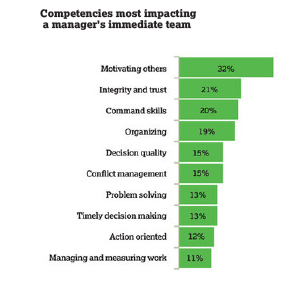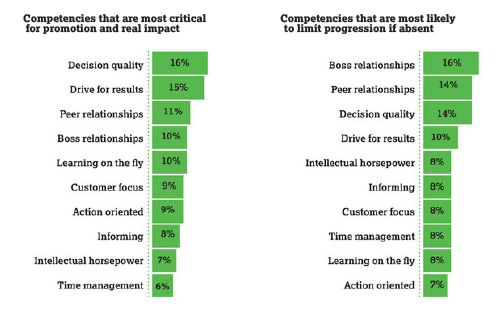by Charles Plant | May 29, 2012 | Management, Research
Back to the Futurestep survey I mentioned last week. This survey looked at something it calls consequential impact which is essentially your ability to get things done through others. Whether you manage people, projects, products or process, you’ll need to get things done through other people. The question the survey attempted to answer was what skills are necessary for you to have consequential impact on your own direct reports. No surprise here but your ability to motivate others and integrity and trust were the most important characteristics. As you move away from being an individual contributor to being a manager of people, such things as problem solving become less important than motivating your direct reports to solve the problems themselves.

by Charles Plant | May 28, 2012 | Exercises
Over the next many weeks, we’ll be presenting a series of leadership and management exercises to help you understand yourself better and to help you become a better leader. This is the first of these exercises. Watch out for them on Mondays as long as I stay organized.
What Drives You?
One of the key factors in emotional intelligence is understanding your emotions. You need to know what drives, angers, motivates, frustrates, and inspires you. By knowing these drivers, you’ll understand why you react the way you do in certain situations. By knowing why you react, you’ll be better able to manage your own emotions and present a controlled and capable exterior in emotional situations.
The Exercise
So here it is, the exercise. Over the next week, pay attention to your emotions. Tune in to the way you are feeling when you’re working, talking to people, or in meetings. As you become aware of those emotions, jot down what was happening and how you were feeling in a little journal. At the end of the week, do some analysis of those feelings. Look for common patterns and identify the things that made you:
- angry
- frustrated
- motivated
- inspired
If you want to learn more about this subject, read Daniel Goleman’s book “Emotional Intelligence” or click here.
by Charles Plant | May 24, 2012 | Innovation, Learning
 Creative people don’t retire. They just keep on creating.
Creative people don’t retire. They just keep on creating.
It’s probably because we love our work that we never want to stop. The question is: Do you love what you do enough to say the same thing? Do you love your work enough to never want to retire? And if you don’t then why not?
Why would you stay doing something that you didn’t absolutely love?
by Charles Plant | May 23, 2012 | Management
Why is it that so many CEO’s with bad leadership skills can continue to exist in organizations? The problem often comes down to a board of directors not doing its job properly.
The board has two jobs, to hire and fire the CEO and to comment on strategy. A board that doesn’t get feedback on a CEO’s leadership skills isn’t doing its job.
It can’t only look at results but must look at leadership skills through such things as 360s to ensure that the CEO’s soft skills are measuring up. Developing and maintaining effective leadership skills is an ongoing process that must be worked on continuously in a conscious manner and must also be evaluated formally on a periodic basis. Without conscious effort to develop and evaluate leadership skills, we’ll be stuck with a bad bunch of bosses.
by Charles Plant | May 22, 2012 | Management
Futurestep has released an interesting study and I’m picking it apart bit by bit. One thing that I found fascinating was a comparison between the things that get you promoted versus the things that will limit your promotability. The following chart shows the competencies most critical for promotion versus the ones most likely to hinder promotion. It found that you get promoted for decisions and results but held back for bad relationships. For those of you who focus on getting results, your good decisions and drive for results will only work so far. Eventually your bad relationships will stall your career.

by Charles Plant | May 16, 2012 | Innovation, Management

Many companies are extolling the benefits of teleworking but to my mind, it’s just an excuse to save money. I don’t believe that you can innovate at a distance, form an effective team at a distance, or lead from a distance. certainly you can manage from a distance but leadership of people on a day to day basis requires an emotional connection.
While you might be able to maintain an emotional connection at a distance, I don’t see how you can create one. Without an emotional connection, you are only managing, not leading remote workers.
The point was driven home in a recent HBR article by Walter Isaacson on Steve Jobs. In the article, Jobs is quoted as saying ” There’s a temptation in our networked age to think that ideas can be developed by e-mail and iChat. That’s crazy. Creativity comes from spontaneous meetings, from random discussions. You run into someone, you ask what they’re doing, you say ‘Wow’ and soon you’re cooking up all sorts of ideas.”




